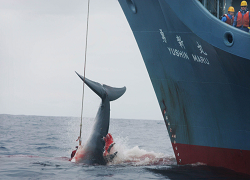From June 26th to July 16th the International Court of Justice (ICJ) will hear arguments from Australia and Japan over the dispute concerning Japan’s whaling program. This will be Japan’s first appearance as a party before the ICJ. The court proceeding began in 2010 and has so far cost Australia over $20 million dollars.
Australia and Japan are key trading partners and both countries have said that the ICJ is the appropriate forum for a dispute between friends; yet, it is believed Japan will defend their case by arguing that the ICJ lacks jurisdiction and that the Japanese whaling program is not a violation of international obligations because it is only for scientific purposes. The ICJ is known as the World Court and has dual jurisdiction – to resolve disputes in accordance with international law that have been submitted to it by States or to give advisory opinions at the request of the UN or other specialized agencies.
Australia maintains that this case falls under the first prong of the court’s jurisdiction. Australia believes Japan has breached its duty under the 1986 International Whaling Commission ban on commercial whaling by hunting the whales and labeling it a scientific program. Australia states that Japan has killed over 10,000 whales since 1988. In comparison, in the 31 years prior to the ban, only 840 whales were killed for research. Tension over this issue between the friendly nations has been building since 1999 when Australia named the Southern Ocean a sanctuary for whales. Australia holds strong to the position that commercial whaling should be outlawed.

Japan argues that their whaling program is for scientific research to prove commercial whaling is viable and therefore exempt under Article 8 of the International Convention for the Regulation of Whaling. Although the whales are killed for scientific research, the whales are brought back to Japan and sold for meat,which is why Australia believes the program is actually a commercial enterprise. Japan defends their right to whaling as part of a culinary tradition and cultural practice; however, whale consumption is significantly low in Japan and it is reported that 5,000 tons of unsold meat remains in storage.
Those who side with Australia note that scientific research on sustainable whale populations can be done without slaughtering the animals. Scientists can use listening devices to track the whales, locate them, and then attach satellite devices to learn more about their breeding and feeding behaviors and patterns. Asking the court to preserve the whales may seem like an emotional stance but a decline in the species affects the marine ecosystem and tourism connected with whale watching expeditions.
The ICJ has also permitted New Zealand to intervene in support of Australia’s position but the ICJ did not grant New Zealand status as a party to the case. Conversely, Norway and Iceland, which have commercial whaling programs, have not moved to intervene in support of Japan’s arguments that whaling is a cultural tradition. Not only is Australia arguing that commercial whaling should cease under the International Whaling Commission ban, but the Animal Welfare Institute has also cited that any attempts, including those by both Norway and Iceland, to sell whale products is banned by the Convention on International Trade in Endangered Species of Wild Fauna and Flora. Iceland has one company that hunts fin whales and the only country it sells to is Japan. However, Iceland also allows for the hunting of endangered minke whales and has exported 3,000 tons of whale meat to Japan since 2006.
The final ICJ decision could impact Japanese public perception on the practice of whaling, which in turn may affect Iceland’s trade with Japan. The case is a large gamble for conservationist nations because the ICJ’s 16 judge panel decision will be final, binding, and with no appeal; the outcome could risk the lives of numerous whale populations. The Attorney-General Mark Dreyfus is hopeful that Australia will win the case and that the ICJ decision will come before the end of the year, preventing the next season of hunting. This case is one that all international and environmental lawyers should tune in for – the public hearings will be broadcast live on the International Court of Justice’s website at www.icj-cij.org/presscom/multimedia.php?p1=6.
Kristen Pariser is a rising 3L, a Staff Editor for the Denver Journal of International Law and Policy, and Executive Editor for The View from Above blog.

